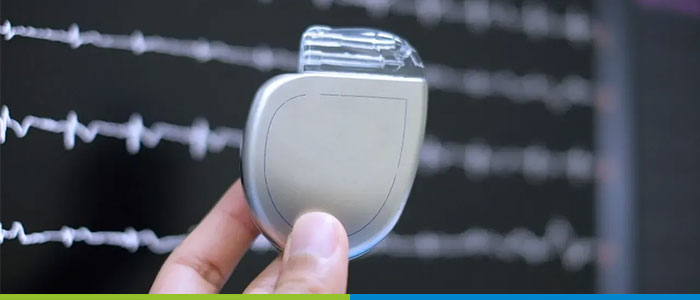Living with a Cardiac Pacemaker: Tips for a Healthy Lifestyle

A pacemaker is an implantable device to regulate the heart’s rhythm. Its primary function is to ensure the correctness or to correct cardiac arrhythmia. Pacemaker procedures can be lifesaving, especially for patients with cardiac problems or patients with heart failure. After the cardiac pacemaker is inserted in your body, a normal beat of the heart is provided, helping in the proper circulation of blood. While it is true that people with pacemakers have to make adjustments in their lives, a person can still have an active lifestyle.
Therefore, in this article, we shall focus on the prevention and control measures for such patients to lead healthy lives in their diet and activity every day.
Understanding the Cardiac Pacemaker Procedure
Before proceeding to lifestyle tips, it is important to understand the basics of the pacemaker procedure. A pacemaker is implanted using a minor surgical procedure. During implantation, a small device is placed under the skin of the upper chest near the collarbone. Wires, called leads, are passed via a vein into the heart’s chambers to regulate electrical activity. This cardiac pacemaker is often recommended for individuals with severe arrhythmias or heart conditions like heart failure. Although the prospect of living with an implanted device may be daunting initially, pacemakers are highly reliable and improve the quality of life for individuals with heart conditions.
Tips To Live A Healthy Life With A Pacemaker
Listed below are some suggestions for living life to the fullest with a pacemaker:
Follow Up Regularly with Your Doctor: It is important to attend follow-up visits with the doctor after the pacemaker is implanted. This will ensure that your cardiac pacemaker is working correctly and your heart responds well to the device. During these visits, your doctor will assess the device’s battery life, adjust settings if needed, and check for any complications related to the pacemaker procedure.
Understanding the Importance of Monitoring Your Heart Health: Pacemakers monitor and regulate heart rhythm, but it’s crucial to pay close attention to your overall heart health. This includes regular monitoring of blood pressure, cholesterol levels, and heart rate. Your doctor can advise you on keeping a heart health journal, tracking variations in symptoms, and maintaining records relating to your level of physical activity. This is especially important if you have a pacemaker for heart failure. Look for signs of fluid retention, shortness of breath, or unusual tiredness and notify your doctor.
Exercise and Physical Activity: One of the most frequently asked questions by people with a pacemaker is if they can exercise afterwards. Of course, regular physical activity is important for the overall health of every person, but some precautions have to be taken into consideration. Following the pacemaker implantation, your cardiologist will recommend the amount of time you have to wait before you can safely resume your physical activities. Low-intensity exercises, such as walking or yoga, will strengthen the cardiovascular system without overexerting the heart. Such exercises maintain good circulation without causing stress to the implanted cardiac pacemaker.
Maintaining a Heart-Healthy Diet: Diet plays a crucial role in managing heart conditions, including those requiring a pacemaker. A heart-healthy diet will contribute to your overall cardiovascular health and ensure the continued functioning of a pacemaker. Whole grains such as oats, brown rice, and fruits and vegetables are considered healthy for your heart. Cut down on processed foods and salt, as high amounts of sodium increase blood pressure and further stress your heart.
Managing Stress and Mental Health: Sometimes, living with a cardiac pacemaker may cause stress, or in other words, anxious situations—especially in the early stages. Your mental health needs the same care as your physical health. Meditation, deep breathing, and progressive muscle relaxation techniques may contribute to reducing stress levels and improvement in heart condition. Furthermore, it is good for psychological recovery to stay connected with friends and family for emotional support.
Be Mindful of Electronic Devices: Pacemakers are sensitive to electromagnetic interference (EMI), emitted by some electronic devices.
- Cell Phones: Keep the cell phone at least six inches from the pacemaker. A good practice is to hold the phone on the ear opposite to where your pacemaker is located when talking on the phone.
- Anti-theft Detectors: Walking rapidly through theft detectors in stores is acceptable, but it is best not to stay near them since they can interfere with your pacemaker’s functioning.
- Medical Procedures: Some medical procedures, such as MRIs or certain types of electrotherapy, may interfere with your cardiac pacemaker.
Traveling with a Pacemaker: Having a pacemaker implanted does not, in any way, mean you have to limit your traveling. However, a bit of preparation is required to ensure a smooth experience. Travel with your pacemaker identification card. This is handy at airports or public security checkpoints. If you are going to a foreign country or to some remote location, be sure you can get medical care if you need it.
Conclusion
Living with a pacemaker involves some adjustments, but you can enjoy a healthy and active life with the right approach. Just remember to follow your doctor’s advice and watch the symptoms most carefully. Take good care of yourself and your pacemaker; it will take care of you.
Omni Hospital provides several cardiac services, from the implantation of pacemakers to the management of implantable cardiac devices under expert guidance and care. Consult our specialists today to get the safest and most reliable treatment for your cardiac issues.
This article has been medically reviewed by Dr Pramod Kumar, Cardiologist
